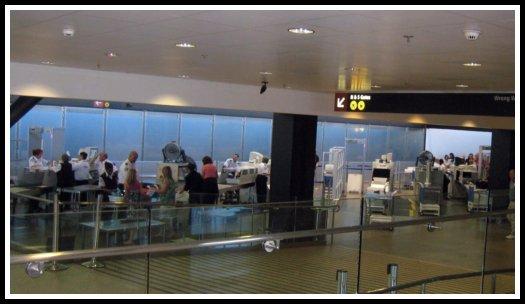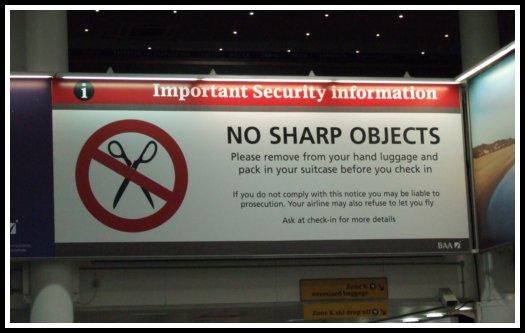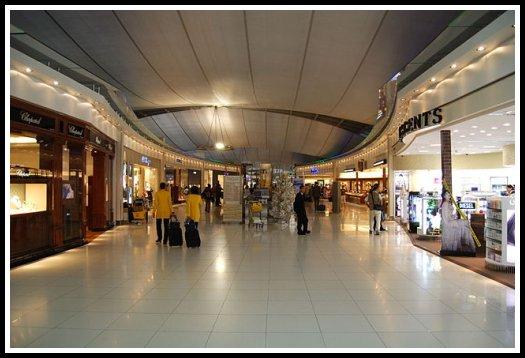Airport security services and customs control
The cockpit is not answering their phone and there's somebody stabbed in business class and there’s, we can't breathe in business class. Somebody's got Mace or something.
- Betty Ong. American Airlines flight attendant, AA Flight 11, phone call to AA reservations.11 September 2011.

Airport security stations at Seattle-Tacoma International Airport
Security
Airport security normally requires baggage checks, metal screenings of individual persons, and rules against any object that could be used as a weapon. Since the September 11, 2001 attacks, airport security has dramatically increased.
Airport security refers to the techniques and methods used in protecting airports and aircraft from crime. Large numbers of people pass through airports. This presents potential targets for terrorism and other forms of crime because of the number of people located in a particular location. Similarly, the high concentration of people on large airliners, the potential high death rate with attacks on aircraft, and the ability to use a hijacked airplane as a lethal weapon may provide an alluring target for terrorism. Airport security attempts to prevent any threats or potentially dangerous situations from arising or entering the country. If airport security does succeed in this, then the chances of any dangerous situations, illegal items or threats entering into both aircraft, country or airport are greatly reduced. As such, airport security serves several purposes: to protect the airport and country from any threatening events, to reassure the traveling public that they are safe and to protect the country and their people.
Airport enforcement authority
While some countries may have an agency that protects all of their airports (such as Australia, where the Australian Federal Police is responsible for security at their major airports), in other countries like the United States, the protection is controlled at the state or local level. The primary personnel will vary and can include:
- a police force hired and dedicated to the airport i.e. the Irish Airport Police Service
- a branch (substation) of the local police department stationed at the airport
- members of the local police department assigned to the airport as their normal patrol area
- members of a country's military
- members of a country's airport protection service
- police dog services for explosive detection, drug detection and other purposes
Other resources may include:
- security guards
- paramilitary forces
- military forces

No sharp objects sign at London-Gatwick Airport
Process and equipment
Some incidents have been the result of travelers being permitted to carry either weapons or items that could be used as weapons on board an aircraft so that they could hijack the plane. Travelers are screened by metal detectors. Explosive detection machines used include X-ray machines and explosives trace-detection portal machines (a.k.a. "puffer machines"). In the United States the TSA is working on new scanning machines that are still effective searching for objects that aren't allowed in the airplanes but that don't depict the passengers in a state of undress that some find embarrassing. Explosive detection machines can also be used for both carry on and checked baggage. These detect volatile compounds given off from explosives using gas chromatography.
A recent development is the controversial use of backscatter X-rays to detect hidden weapons and explosives on passengers. These devices, which use Compton scattering, require that the passenger stand close to a flat panel and produce a high resolution image. A technology released in Israel in early 2008 allows passengers to pass through metal detectors without removing their shoes, a process required as walk-through gate detectors are not reliable in detecting metal in shoes or on the lower body extremities. Alternately, the passengers step fully shod onto a device which scans in under 1.2 seconds for objects as small as a razor blade. In some countries, specially trained individuals may engage passengers in a conversation to detect threats rather than solely relying on equipment to find threats.
Generally people are screened through airport security into areas where the exit gates to the aircraft are located. These areas are often called "secure/sterile areas". Passengers are discharged from airliners into the sterile area so that they usually will not have to be re-screened if disembarking from a domestic flight. However they are still subject to search at any time. Airport food outlets have started using plastic glasses and utensils as opposed to glasses made out of glass and utensils made out of metal to reduce the usefulness of such items as weapons.
In the United States non-passengers were once allowed on the concourses to meet arriving friends or relatives at their gates, but this is now greatly restricted. Non-passengers must obtain a gate pass to enter the secure area of the airport. The most common reasons that a non-passenger may obtain a gate pass is to assist children and the elderly as well as for attending business meetings that take place in the secure area of the airport. In the United States, at least 24 hours notice is generally required for those planning to attend a business meeting inside the secure area of the airport. Other countries, such as Australia do not restrict non-travelers from accessing the airside area, however non-travelers are typically subject to the same security scans as travelers.
Sensitive areas in airports, including airport ramps and operational spaces, are restricted from the general public. Called a SIDA (Security Identification Display Area), these spaces require special qualifications to enter.
Throughout the world, there have been a few dozen airports that have instituted a version of a "trusted traveler program". Proponents argue that security screening can be made more efficient by detecting the people that are threats, and then searching them. They argue that searching trusted, verified individuals should not take the amount of time it does. Critics argue that such programs decrease security by providing an easier path to carry contraband through.
Another
critical security measure utilized by several regional and international
airports is the use of Fiber Optic Perimeter Intrusion Detection Systems. These
security systems allow airport security to locate and detect any intrusion on
the airport perimeter, ensuring real-time, immediate intrusion notification
that allows security personnel to assess the threat and track movement and
engage necessary security procedures. This has notably been utilized at Dulles
International Airport and U.S. Military JFPASS.
Border Control
Border controls are measures used by a country to monitor or regulate its borders. The control of the flow of many people, animals and goods across a border may be controlled by government Customs services. Security is enforced by various kinds of Border Guards and Coast Guards. Official designations, jurisdictions and subordinations of these agencies vary. Border controls exist to:
- regulate immigration (both legal and illegal)
- control the movement of citizens
- (in certain countries as USA and New Zealand) execute the customs functions as to:
- collect excise tax
- prevent smuggling of drugs, weapons, endangered species and other illegal or hazardous material
- control the spread of human or animal diseases
The degree of strictness of border controls depends on the country and the border concerned. In some countries, control may be targeted at the traveler's national origin or other countries that have been visited. Others may need to be certain the traveler has paid the appropriate fees for their visas and has future travel planned out of the country. Yet others may concentrate on the contents of the travelers baggage, and imported goods to ensure nothing is being carried that might bring a biosecurity risk into the country. In the member states of the Schengen agreement, internal border control is often virtually unnoticeable, and often only performed by means of random car or train searches in the hinterland, while controls at borders with non-agreement states may be rather strict. Sometimes border controls exist on internal borders within a country. For example, in the People's Republic of China, there are border controls at the borders among the mainland and the Special Administrative Regions of Hong Kong and Macau, even though they are part of the same country.

Duty free shop at Bangkok-Suvarnabhumi International Airport
Customs
Customs is an authority or agency in a country responsible for collecting and safeguarding customs duties and for controlling the flow of goods including animals, transports, personal effects and hazardous items in and out of a country. Depending on local legislation and regulations, the import or export of some goods may be restricted or forbidden, and the customs agency enforces these rules. The customs authority may be different from the immigration authority, which monitors persons who leave or enter the country, checking for appropriate documentation, apprehending people wanted by international arrest warrants, and impeding the entry of others deemed dangerous to the country. In most countries customs are attained through government agreements and international laws.
A customs duty is a tariff or tax on the importation (usually) or exportation (unusually) of goods. In the Kingdom of England, customs duties were typically part of the customary revenue of the king, and therefore did not need parliamentary consent to be levied, unlike excise duty, land tax, or other forms of taxes.
Commercial goods not yet cleared through customs are held in a customs area, often called a bonded store, until processed. All authorised ports are recognised customs area.
UTC | Zulu Time
Copyright © 2012 Roger. All rights reserved. | Sitemap